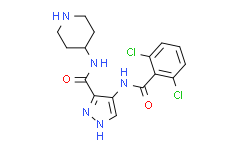| Description: |
AT7519 as a potent inhibitor of CDKs, with IC50s of 210, 47, 100, 13, 170, and <10 nM for CDK1, CDK2, CDK4 to CDK6, and CDK9, respectively. |
| In Vivo: |
AT7519 inhibits tumor growth in a human MM xenograft mouse model[1]. AT7519 (4.6 and 9.1 mg/kg/dose) inhibits the growth of early-stage HCT116 tumor xenografts. AT7519 (10 mg/kg, i.p.) also inhibits the target CDKs in HCT116 tumor-bearing BALB/c nude mice[2]. |
| In Vitro: |
AT7519 (0-4 μM) results in dose-dependent cytotoxicity with IC50s ranging from 0.5 to 2 μM in MM cells, and this induced cytotoxicity is associated with GSK-3β activation independent of transcriptional inhibition. AT7519 overcomes proliferative advantage conferred by cytokines and the protective effect of BMSC. AT7519 (0.5 μM) induces apoptosis of MM cells in a time-dependent manner. Moreover, AT7519 (0.5 μM) inhibits phosphorylation of RNA polymerase II CTD and partially inhibits RNA synthesis in MM.1S cells[1]. AT7519 (250 nM) inhibits cell cycle progression in human tumor cell lines. AT7519 also induces apoptosis of human tumor cell lines[2]. AT7519 (100-700 nM) induces apoptosis in leukemia cell lines. AT7519 also inhibits transcription in human tumor cell lines. Furthermore, AT7519 inhibits RNA polymerase II and reduces antiapoptotic protein levels[3]. |
| Cell Assay: |
AT7519's effects on viability of MM cell lines, primary MM cells, and PBMNCs is assessed by measuring 3-(4,5-dimethylthiazol-2-yl)-2,5 diphenyl tetrasodium bromide (MTT) dye absorbance. DNA synthesis is measured by tritiated thymidine uptake (3H-TdR). MM cells (2-3 × 104 cells/well) are incubated in 96-well culture plates with media and different concentrations of AT7519 and/or recombinant IL-6 (10 ng/mL) or IGF-1 (50 ng/mL) for 24 or 48 h at 37°C and 3H-TdR incorporation is measured. |
| Animal Administration: |
To evaluate the in vivo anti-MM activity of AT7519, male SCID mice are inoculated subcutaneously with 5×106 MM.1S cells in 100 μL serum-free RPMI 1640 medium. When tumors are measurable, mice are treated intraperitoneally (IP) with vehicle or AT7519 dissolved in saline 0.9%. The first group of 10 mice is treated with 15 mg/kg once a day for five days for 2 weeks, and the second group is treated with 15 mg/kg once a day three times a week for four consecutive weeks. The control group receives the carrier alone at the same schedule. Tumor size is measured every alternate day in 2 dimensions using calipers, and tumor volume is calculated with the formula: V= 0.5 a × b2 (a= long diameter of the tumor, b= short diameter of the tumor). Animals are sacrificed when the tumor reaches 2 cm3 or when the tumor is ulcerated. Survival and tumor growth are evaluated from the first day of treatment until death. |
| References: |
[1]. Santo L, et al. AT7519, A novel small molecule multi-cyclin-dependent kinase inhibitor, induces apoptosis in multiple myeloma via GSK-3beta activation and RNA polymerase II inhibition. Oncogene. 2010 Apr 22;29(16):2325-36.
[2]. Squires MS, et al. Biological characterization of AT7519, a small-molecule inhibitor of cyclin-dependent kinases, in human tumor cell lines. Biological characterization of AT7519, a small-molecule inhibitor of cyclin-dependent kinases, in human tumor cell lines.
[3]. Squires MS, et al. AT7519, a cyclin-dependent kinase inhibitor, exerts its effects by transcriptional inhibition in leukemia cell lines and patient samples. Mol Cancer Ther. 2010 Apr;9(4):920-8. |






















